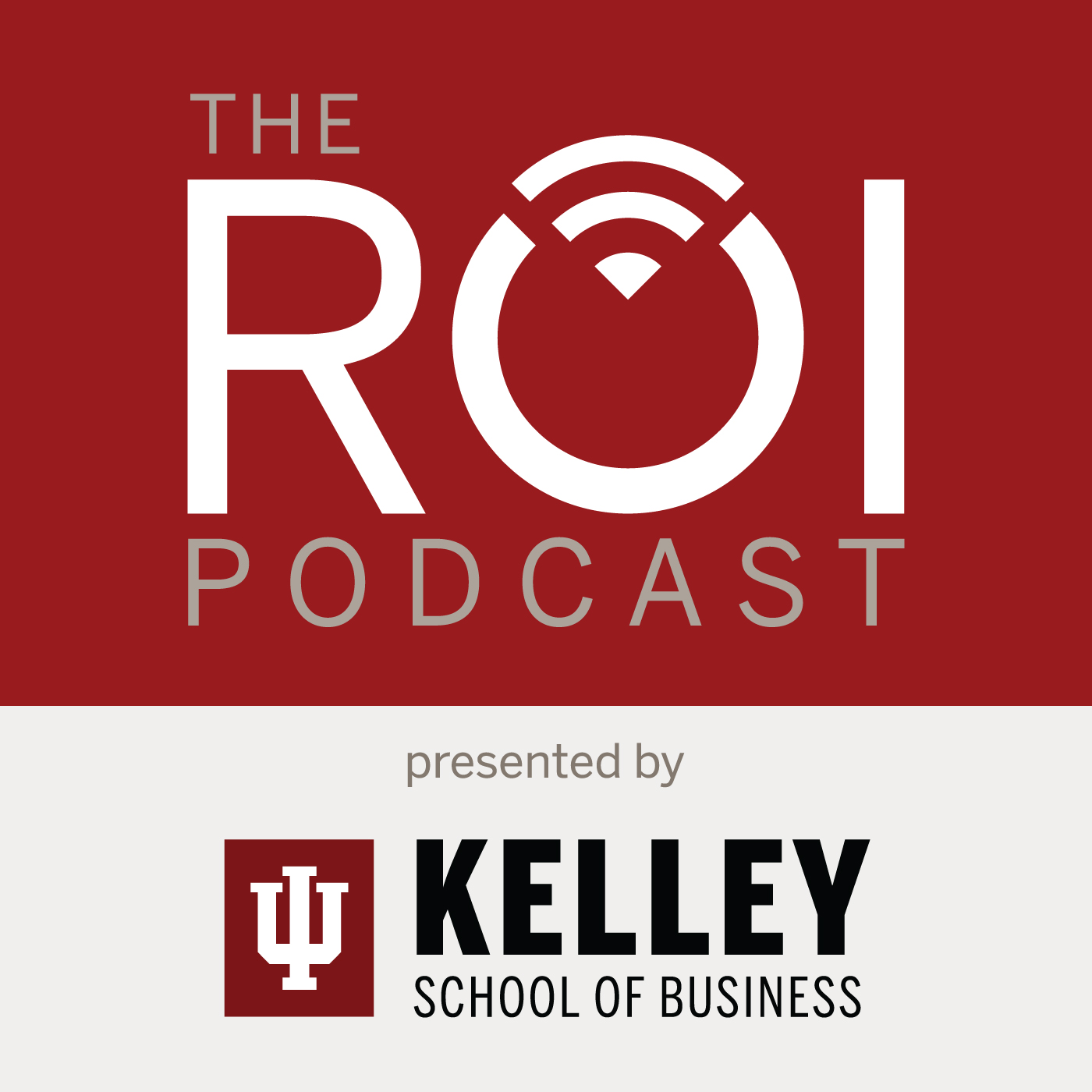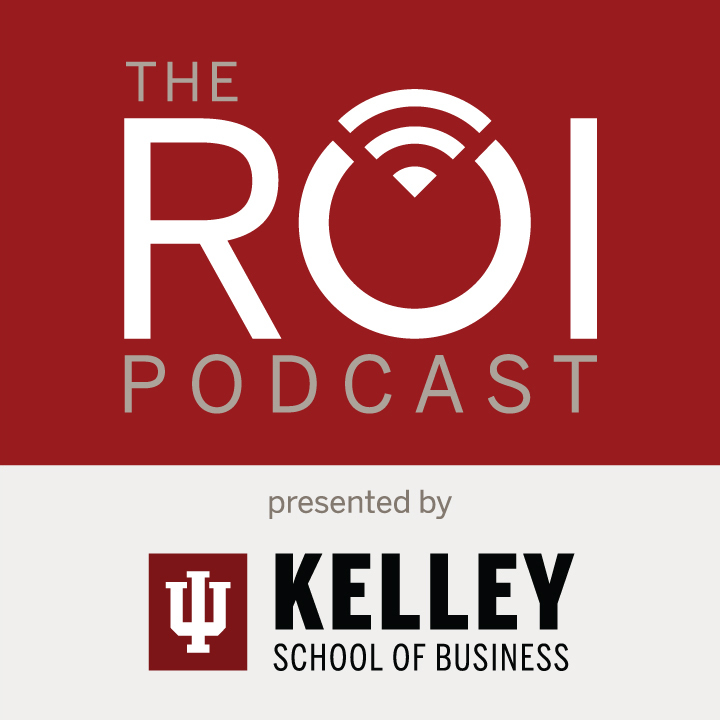
The ROI Podcast provides professionals from all industries with actionable insight from world-renowned faculty members at Indiana University's Kelley School of Business. Learn not only from award-winning faculty but business experts who are disrupting their respective industries. The ROI Podcast equips you and your organization with the knowledge to keep a competitive edge over the competition.
Episodes

Monday Feb 19, 2018
Why you should surround yourself with talent | Ep. 38
Monday Feb 19, 2018
Monday Feb 19, 2018
In part two of our interview with Kelley School of Business Dean Idie Kesner, Idie discusses how she measures her success, why surrounding yourself with the right people can transform your life and the secret to magnifying your results. This interview is part two of The ROI Podcast's CEO Series.
----
Do you have a question? Looking to get help on a business decision? Know a great guest for our show? Email roipod@iupui.edu so we can help your organization make better business decisions.
----
Ready to take your next step? Check out if a Kelley MBA is right for you: https://bit.ly/3m2G6D5
----
Show Notes:
(The ROI Podcast Intro Music)
Shane: Welcome Back! We’ve got another episode for you here on The ROI Podcast Presented by The Kelley School of Business on the IUPUI Campus in downtown Indianapolis!!! I am one of your hosts, Shane Simmons. And Phil Powell is here with me. As most of you know, Phil is the Associate Dean of Academic Programs at the Kelley School. How are you, Phil?
Phil: I'm doing great, Shane! It's always a good day at the Kelley School.
Shane: This is episode 38 of the podcast and its part two of our interview with the Kelley School’s Dean Idie Kesner. If you haven’t had a chance to listen to last week’s episode, then I suggest going back and doing that because there was an interesting discussion about the core characteristics of an impactful leader. But today, we’re going to chat more about the emotional drive great leaders have, surrounding yourself with the right team, and we’ll dig into how you can keep yourself away from distractions and perform your work at the highest level. Phil, take it away.
Phil: As you said – last week we discussed the characteristics that make a great executive and an impactful leader. We mentioned people must have the talent to succeed, the humility to grow, and the tenacity to persevere. So we’ve covered the mindset – but as an executive, you’ve got to deliver results. So I asked Idie how do you know on a weekly basis that the organization is moving in the right direction.
Idie: Phil, I think you said the magic words in terms of what needs to happen – you have to identify multiple measures all along the path. Simply setting out the end goal, which is important for getting everybody on the page, is not enough. 9:48 You have to have metrics and measures all along the way that tell you're making steady progress and give you opportunities for celebrating within the organization. That first requires knowing your mission, [translating] that mission into goals, and [setting] up measurable objectives that are very specific – quantifiable both in level and in time – and those measurable objectives that fit your organization, your tasks, projects, and responsibilities. They are unique and customized for each organization, [and] they have to be there. Bottom line, you’ve got to understand your mission, translate it into goals, have measurable objectives that are very specific to the task or project that you’re working on that happen all along the way and guide you on your path.
Phil: Now those key performance indicators, or KPIs, that Idie mentions may be unique depending on the task at hand. A KPI for advertising may be your total revenue generated compared to the amount spent.
Shane: Or, if you’re talking about something like boosting company morale, those indicators could survey responses, number of days people called off sick, or more qualitative measurements.
Phil: Exactly – but Idie says the implementation is the same: Focus on the objective, monitor the results, and keep your eye on the prize.
Idie: I want to key off of something you said when you started that question, and that is, how do you deliver on all of this - basically knowing you’re one person with limited hours, and perhaps even limited capabilities. The ultimate answer is you have to surround yourself with people whose talents are a good compliment to yours. That means you have to be very self-aware, you have to understand where your strengths and weaknesses are, and then you have to surround yourself with people who fill those gaps for you, trust that they’re good people – hopefully, you’ve made the right decisions about who you brought in – and recognize that they’re going to be able to do their jobs. In fact, because they fill your gaps, they’re going to be able to do their jobs better than you would be able to do their jobs.
Phil: To all of you listening out there, think about what Idie just said – you have to surround yourself with a team that compliments your own strengths. That’s where diversity in talents can really play a vital role in a successful organization. Idie shares an example.
Idie: Now I’ll give you an illustration for me personally, I do think I actually have some self-awareness about some of the key weaknesses I have. One of them is I’m an extremely risk-adverse person, but in this job, you really do have to take some risks – you have to place some bets down, and you have to try and move the organization forward. So I try to surround myself with people who are willing to take those risks, willing to hold me responsible for moving the organization forward by accepting the fact that they have to hold me to the same standard. I think that that’s important: I didn’t surround myself with other risk-adverse people, I surrounded myself with a team of people who compliment the few issues that I have that are of concern to me in leading this organization.
Phil: Now the final tip we discussed with Idie when it comes to running a successful organization has to do with passion and getting everybody on board with the organization’s mission. This is important for two reasons: 1. It prevents burnout and 2. Passion is what drives innovation and creativity which can produce extraordinary results.
Idie: There are many times - last night’s a classic example - when I go home and was continuing to work until about 10 o’clock. What allows me to do that and maintain that energy is the feeling of commitment, passion, and focus that I have for the organization – it does not work when you really enjoy what you’re doing. I learned that lesson from my father, who was a stockbroker, who’d work all day in the office and come home at night. He’d study the market intensively, hours on end, and wouldn’t go to bed until late, and he’d be studying the next day to better serve his clients. He enjoyed the stock market, doing well by his clients, making great recommendations, and always said, “I’m not working – this is my passion and hobby and this is what I enjoy doing!” I think, obviously, stay focused on what drives you and what gives you energy from the organization, what inspires you, what makes you feel good about the job you’re doing. If you can’t answer that question, you need to be preparing yourself for that next position, whether that’s advancing yourself educationally or looking for other positions that can speak to your heart and soul. Life is way too short to be in a job that is sheer drudgery, that every hour that I’m there, I’m not enjoying myself. You have to find things that really drive you. Now, some people find ways around this: they have their job, and [a] life outside of work, where they’re doing community service and other things. That’s a great way to compromise to have the best of both worlds, but how much better can it be when the best of those worlds is embedded in your job when you feel that same sort of commitment and passion, and it comes from your daily work, and not just the sidelines? It’s not always easy to understand what that is, but you need to look for it in the organization – what is it that drives me about this organization, what excites me, how can I be a contributor, how can I make a difference? If you find those things, that will be the spark that you need.
(Closing Music)Phil: Wow. Those were great insights from Dean Idie Kesner from here at the Kelley School. Our listeners should know that what you've heard from Idie is reflected in how she leads our school on a day-to-day basis. She is an inspirational leader, and the type of leader we want all of our students to aspire to.
(The ROI Podcast Music)
Shane: What a way to kickoff our CEO series! So all of you listeners out there – remember: Understand your organization’s mission, create measurable objectives, and follow through… And when you mix passion with that – that’s when magnificent results can follow.
Shane: That’s going to do it for part one of this episode of The ROI Podcast. We want to thank Kelley School of Business Dean Idie Kesner for her time and insights. Don’t forget to subscribe to the podcast and leave us a review on iTunes! We’ll be right back here next week. Have an amazing day!

Comments (0)
To leave or reply to comments, please download free Podbean or
No Comments
To leave or reply to comments,
please download free Podbean App.